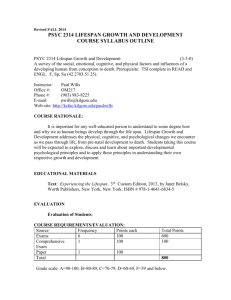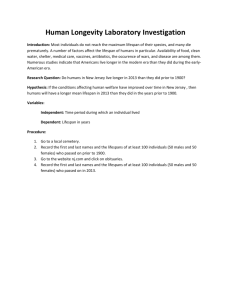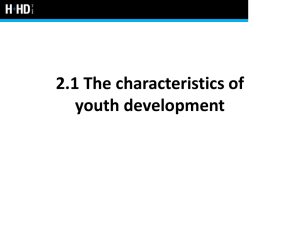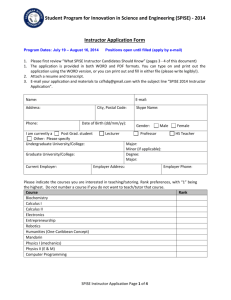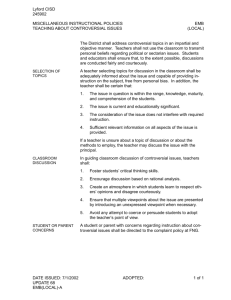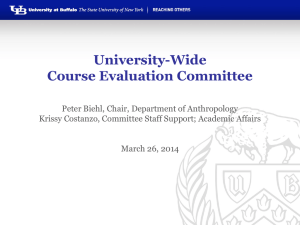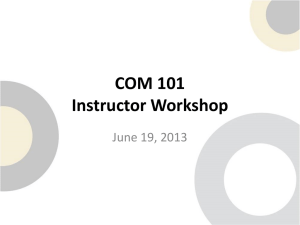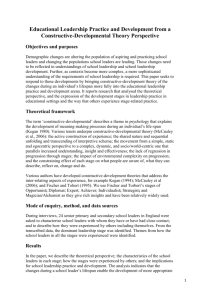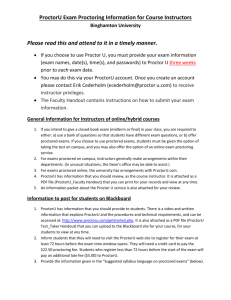COURSE - Kilgore College
advertisement
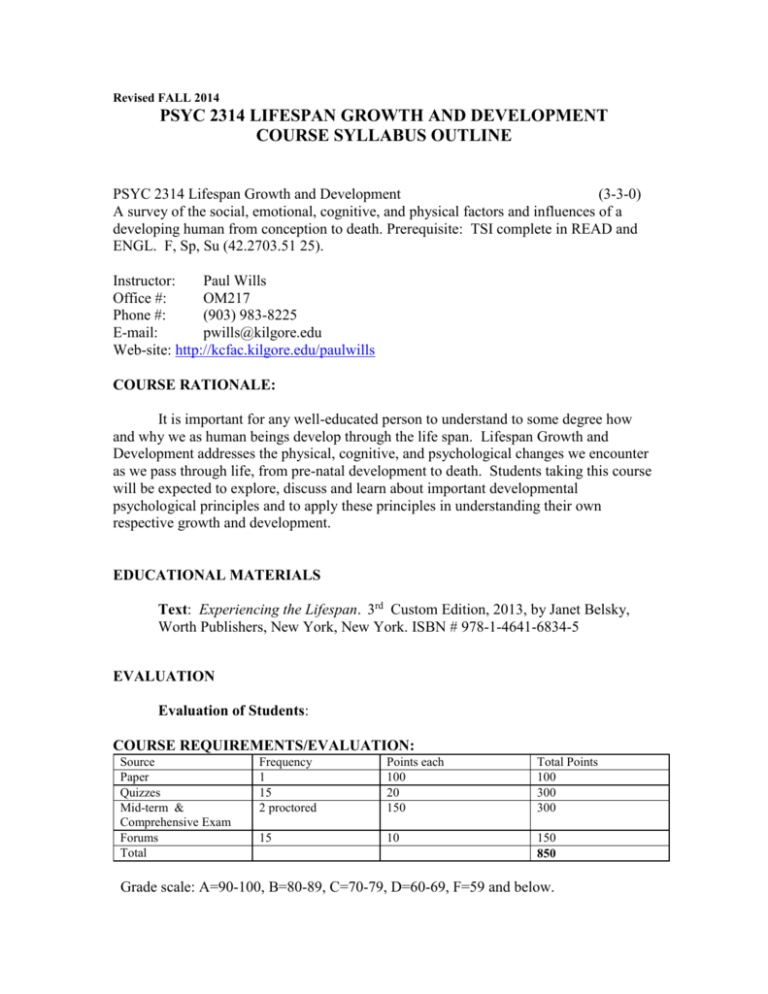
Revised FALL 2014 PSYC 2314 LIFESPAN GROWTH AND DEVELOPMENT COURSE SYLLABUS OUTLINE PSYC 2314 Lifespan Growth and Development (3-3-0) A survey of the social, emotional, cognitive, and physical factors and influences of a developing human from conception to death. Prerequisite: TSI complete in READ and ENGL. F, Sp, Su (42.2703.51 25). Instructor: Paul Wills Office #: OM217 Phone #: (903) 983-8225 E-mail: pwills@kilgore.edu Web-site: http://kcfac.kilgore.edu/paulwills COURSE RATIONALE: It is important for any well-educated person to understand to some degree how and why we as human beings develop through the life span. Lifespan Growth and Development addresses the physical, cognitive, and psychological changes we encounter as we pass through life, from pre-natal development to death. Students taking this course will be expected to explore, discuss and learn about important developmental psychological principles and to apply these principles in understanding their own respective growth and development. EDUCATIONAL MATERIALS Text: Experiencing the Lifespan. 3rd Custom Edition, 2013, by Janet Belsky, Worth Publishers, New York, New York. ISBN # 978-1-4641-6834-5 EVALUATION Evaluation of Students: COURSE REQUIREMENTS/EVALUATION: Source Paper Quizzes Mid-term & Comprehensive Exam Forums Total Frequency 1 15 2 proctored Points each 100 20 150 Total Points 100 300 300 15 10 150 850 Grade scale: A=90-100, B=80-89, C=70-79, D=60-69, F=59 and below. Exams: You will have 15 chapter quizzes that are online. You mid-term and comprehensive exams are proctored, mean these test are taken under supervision. You have two options for taking these proctored exams, they are listed below. If you fail to take the mid-term by using Proctor U or a testing center you will be dropped from the course. Option 1: ProctorU - see www.proctoru.com/kilgore ProctorU is a company that offers live Internet proctoring via webcam. You create an account with ProctorU and reserve a time slot for your exam least two business days prior to the exam. When you log back into the site for your exam appointment, a proctor makes a connection with your computer and supervises you while you take your test. ProctorU charges $25 for a 2-hour exam. Additional fees exist for longer exams and appointments scheduled less than four days ahead of time. You need a webcam with a microphone and a good Internet connection to use ProctorU. Set up ahead of time. Option 2: Testing Center Each student must make an appointment with the testing center of his/her choice at least two business days prior to testing. Students who opt to use a non-Kilgore College testing center must also contact the instructor at least four business days prior to testing to make arrangements. NonKilgore College testing centers usually require a fee for their services, unless you are a student at that institution as well. Confirm with your testing center Mid-Term & Comprehensive Exam: This is a multiple choice exam composed of all the theories covered in this course. The main theories covered in this course up to the time of the exam are represented. In example: Topic- Main Theories- Psychosocial Development, Cognitive Development, Socioemotional Development. Forums are completed asynchronously, meaning that you may log on to the Discussion Board and post your response at any point during the week (24/7). The forum questions will be posted each Monday morning of the term week and must be completed by the following Sunday of each term week. Students are evaluated on both the quality and depth of their own original response to all sections of the Forum. Students must post respond comments to at least TWO of their classmates’ postings to receive full point value for each discussion board forum. This response should take the form of a sentence or two, not just “I agree” or “me too”. The forums are graded using a rubric; each forum question elicits a response from the student. This response must be base off factual information found in the book not your opinion. The originality of your response is how you put this information together to answer the questions. Make-up Policies: For any missed work you must have a legitimate reason to obtain approval to make it up. Evaluation of Instructor. At the end of the semester, students will be given an opportunity to evaluate the instructor and the course. Approved evaluation forms are provided by the Office of Institutional Research, which is also responsible for their analysis. CLASSROOM POLICIES Attendance: Students should read the attendance policy in the Kilgore College Catalog and be aware that an instructor may drop a student from class as a result of excessive absences, which is defined as more than six hours, although students who quit attending class are ultimately responsible for withdrawing themselves. Instructors may also withdraw students from a course for lack of participation. Make-up procedure. For any missed work you must have a legitimate reason to obtain approval to make it up. Once approval is granted all make up tests will be given on the last week of the semester. The exam will cover the same content but have different questions. You will not be able to make-up the final. Academic honesty statement: Students are requested to read about the sanctions for academic dishonesty outlined in the Kilgore College Student Handbook. It states in part that the faculty member “…may recommend penalties such as withdrawal from the course, failing the course, assignment, or in other academic work; denial of a degree and/or performing additional academic work not required by other students in the course.” Drop Date: As a general rule, students may drop a course until 75% of the term has been completed. Students are requested to read the Student Initiated Drops and Withdrawals statement of the Kilgore College Catalog which states in part: “All course drops, whether instructor or student initiated, shall result in a “W” during the first twelve weeks of a long term or twenty-one days of a summer term. During the thirteenth and fourteenth weeks of a long term, or the twenty-second through the twenty-fourth days of a summer term, such drops will result in a "W" if the student is passing or "F" if the student is failing. A student may not drop or withdraw during the last two weeks of a long semester or following the twenty-fourth class day of a summer term; however, instructors should continue to drop students for absences until final examinations begin. The last day to withdraw with a “W” during a two week mini semester is day thirteen; during a four week term is day twenty; and during an eight week term is day thirty-four.” COMMON COURSE OBJECTIVES Common Core Curriculum for PSYC 2314 CORE CURRICULUM COMPONENT APPLICATION Social/Behavioral Science -- Courses in this category focus on the application of empirical and scientific methods that contribute to the understanding of what makes us human. Courses involve the exploration of behavior and interactions among individuals, groups, institutions, and events, examining their impact on the individual, society, and culture. Lifespan Growth and Development (3-3-0) Lifespan Growth and Development is a study of social, emotional, cognitive and physical factors and influences of a developing human from conception to death. Prerequisite: Must be TSI complete in READ and ENGL. F, Sp, Su (4227035125). How will the objective be addressed? How will the objective be assessed? Critical Thinking Analysis of information Evaluation of information Students will be introduced to the skill of analysis through applying it to controversial topics that are relevant to course content. This will be addressed by lecture, class discussion, power point presentations, and text readings. Students will be introduced to the skill of evaluation through applying it to controversial topics that are relevant to course content. This will be addressed by lecture, class discussion, power point presentations, and text readings. Students will apply the skill of analysis to a controversial topic in Lifespan Growth and Development by writing an essay with a clearly developed thesis, along with relevant supporting evidence, and which will be a minimum of two pages in length. The department will create a list of controversial topics in psychology from which the students will choose. The department will develop a grading rubric based on content, critical thinking skills, and standard English grammar. Instructors will require students to use Turnitin.com as a means to further reinforce students’ own personal responsibility when citing sources and/or using their own words. APA style will be used in citing sources. Students will apply the skill of evaluation to a controversial topic in Lifespan Growth and Development by writing an essay with a clearly developed thesis, along with relevant supporting evidence, and which will be a minimum of two pages in length. The department will create a Synthesis of information Students will be introduced to the skill of synthesis through applying it to controversial topics that are relevant to course content. This will be addressed by lecture, class discussion, power point presentations, and text readings. innovation Inquiry list of controversial topics in psychology from which the students will choose. The department will develop a grading rubric based on content, critical thinking skills, and standard English grammar. Instructors will require students to use Turnitin.com as a means to further reinforce students’ own personal responsibility when citing sources and/or using their own words. APA style will be used in citing sources. Students will apply the skill of synthesis to a controversial topic in Lifespan Growth and Development by writing an essay with a clearly developed thesis, along with relevant supporting evidence, and which will be a minimum of two pages in length. The department will create a list of controversial topics in psychology from which the students will choose. The department will develop a grading rubric based on content, critical thinking skills, and standard English grammar. Instructors will require students to use Turnitin.com as a means to further reinforce students’ own personal responsibility when citing sources and/or using their own words. APA style will be used in citing sources. Creative thinking Communication Effective development, interpretation and expression of ideas through -written communication -oral communication visual communication Empirical and Quantitative Skills Manipulation of numerical data or observable facts resulting in informed conclusions See Analysis, Evaluation, and Synthesis sections. Essay graded based on content, critical thinking skills, and standard English grammar using a departmental rubric. Using raw data, students will convert that data into measures of central tendency that will lead to a scientific explanation of the data. Embedded questions _ multiple choice test All instructors will use standard embedded questions. All questions are addressing the basic obtainment levels held across the field of Developmental Psychology.. Analysis of numerical data or observable facts resulting in informed conclusions Using parametric statistical data students will analyze a bell curve, illustrating the relationship between IQ classifications and a person’s predicted ability to survive in an academic setting. This exercise will aid in a basic understanding of research parameters and to develop better consumers of researched data Delivery method: lecture, text, readings, informal class discussion, PowerPoint presentation Social Responsibility Intercultural competence Embedded questions – multiple choice test All instructors will use standard embedded questions. All questions are addressing the basic obtainment levels held across the field of Developmental Psychology. Knowledge of civic responsibility Ability to engage effectively in global communities Research based parenting practices Embedded questions – multiple choice test Delivery method: lecture, text, readings, informal class discussion, PowerPoint presentation, class participation in role play all instructors will use standard embedded questions. Comparison of Nurture effect on development via differing cultures and cultural practices. Embedded questions – multiple choice test Delivery method: lecture, text, readings, class discussion, visual aids, and power point presentation. All questions are addressing the basic obtainment levels held across the field of Developmental Psychology all questions are addressing the basic obtainment levels held across the field of Developmental Psychology all instructors will use standard embedded questions National communities Regional communities Critical Thinking Skills - to include creative thinking, innovation, inquiry, and analysis, evaluation and synthesis of information Communication Skills - to include effective development, interpretation and expression of ideas through written, oral and visual communication Empirical and Quantitative Skills - to include the manipulation and analysis of numerical data or observable facts resulting in informed conclusions Social Responsibility: to include intercultural competence, knowledge of civic responsibility, and the ability to engage effectively in regional, national, and global communities Student Learning Outcomes: Upon successful completion of this course, students will: 1. Describe the stages of the developing person at different periods of the life span from birth to death. 2. Discuss the social, political, economic, and cultural forces that affect the development process of the individual. 3. Identify factors of responsible personal behavior with regard to issues such as sexual activity, substance abuse, marriage and parenting. 4. Explain the biosocial, cognitive and psychological influences throughout the lifespan as an ongoing set of processes, involving both continuity and change. 5. Describe the different developmental perspectives of the major theories of development (i.e. cognitive, learning, humanistic and psychodynamic). 6. Identify examples of some of the cultural and ethnic differences that influence development throughout the lifespan. 7. Discuss the various causes or reasons for disturbances in the developmental process. ADA STATEMENT Kilgore College is committed to making reasonable accommodations to assist individuals with disabilities in reaching their academic potential. If you choose to request accommodations for a documented disability which may impact your performance, attendance, or grades in this course, you must first register with the Office of Disability Services. Please note that classroom accommodations cannot be provided prior to your instructor’s receipt of an accommodation letter from the Office of Disability Services. For more information about accommodations, please contact the Disability Services office on the second floor of the Devall Student Center: (903) 983-8206. DISCLAIMER Your instructor reserves the right to make modifications in content and schedule as necessary to promote the best education possible within prevailing conditions affecting this course.
